Text

Book Review: The Lord of the Rings Series
I adore this series. Admittedly, this was my first ever read-through of Lord of the Rings, and I must say that this series is an endearing, sincere, and whole depiction of how even the smallest of good can overcome the darkest of darkness. From the lore to the poetry, I understand now why it is regarded as a masterpiece. If you love deeply woven fantasy with high stakes and intricate lore and world building, then this is for you.
⭐️⭐️⭐️⭐️⭐️
0 notes
Text

0 notes
Text

Hello, my good friend ☺️
0 notes
Text
THE RAVEN PRAYER
A poem by William F. Burk
------------------------------------------------------------------------
The birds will gaze upon the stars and wonder why they dance.
The sky above, so dark and speckled— they lust to feel the air.
Oh, Man Above, what do you see when you watch the ravens fly? Is it joyous? Do you weep? When you let the birds take wing—and do you care for the flocks of birds as much as you do me?
Oh Man Above— if you are above—do you see us scurry about? Tell me now, what is aloof in your mind? What do you think about the stars as you call their names when they fall or die?
And are we the stars that died ago, and does our light reach you? Do you see each of us here, striving to- and-fro—and what do you think of our lights— the ones that died long ago?
Oh, Man Above, I must admit—
I watch the birds as I gaze upon the stars, and I wonder why we dance.
#spilled ink#poetry#writeblr#original poem#writers on tumblr#poets on tumblr#writerscommunity#amwriting
0 notes
Text
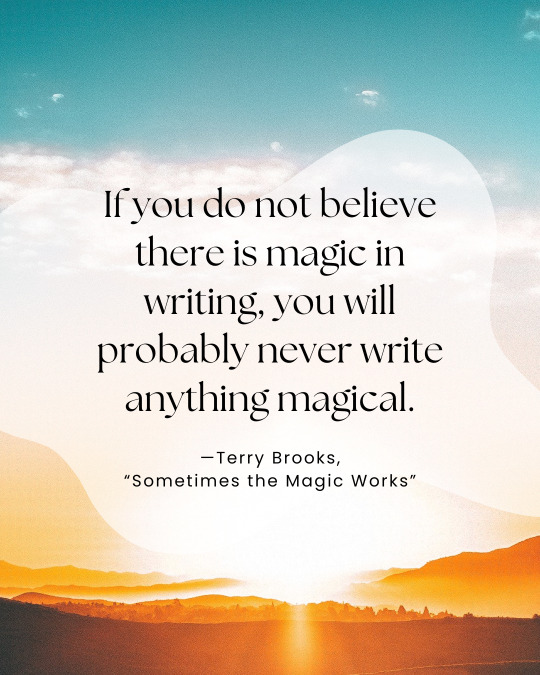
#writing#writeblr community#writeblr#writing community#inspiration#quotes#writing commentary#writing advice
5 notes
·
View notes
Text
Carcass of a Star
Flash Fiction, By William F. Burk

Eli stood as he stared straight up into the night sky. He viewed a great beyond, dotted with subtle freckles of light here and there. Silence was the accompaniment of the occasion, and every now and again it seemed his mind could place patterns in the way the stars hung, creating the illusion that the vespers were connected by faint lines. He knew; however, this was merely his eyes playing tricks on him. The sky was a black canvas, and, the longer he looked, the deeper it appeared. He remembered his teachers in high school science class saying that some stars had died out millions of years ago and that the light we see in the sky simply hasn't reached Earth yet.
It was a melancholic moment; to think the brilliant light of a star could merely be the grandeur of a glory long gone.
Eli lowered his head.
He told himself he wouldn't think of her; he told himself he would forget. He would come outside, look at the stars——put it in “perspective.”
No.
It was futile.
Eli sighed deeply as he walked across the weathered boards of his back porch to the door. Locking the door behind him as he entered, he sunk into the recliner. The old cushions seemed to swallow him whole, casting him into an abyss shadowed by the darkness of the room around him. He had no words; loud emotion enveloped a silent man.
Turning on the TV was useless; he couldn't focus. He tried calling her. Once. Twice. Four times...
Nothing.
Even the stars live in the past, he thought to himself, remembering how close they were at one time. His stomach tore and writhed; her smile made him anxious. Her hazel eyes were akin to the stardust illuminated by a distant sun. She was a spectacle: a marvel that danced around him when they walked the historic district. Nothing about her was commonplace, but everything about her absence was. The days without her voice were deafening.
The air was stagnant.
Eli raised from the chair and walked down the hall. The scuffing of his feet made a scratching sound as the rubbed against the aged carpet. He changed into more comfortable clothes, then went to bed. Another day had gone; another day had been wasted. He lay for a while, then slumber took him. A chilly autumn night, once more: alone.
But even worse: once more, mundane.
#writeblr#creative writing#flash fiction#writers#original story#amwriting#sad boy#love lost#sadnees#angst
0 notes
Text
What is a Protagonist’s “Rebirth”?
3/3/2021
0 Comments
How the Finding of the "Treasure" Leads to a Protagonist's Resurrection
It is the destiny of the hero or heroine to undertake the weight of hardships within a story. But it is the journey to the crisis that determines the essence of the resurrection. Only birth has the power to spite the fangs of death; only birth can crawl from its jaws, unscathed, and thusly, the only way to overcome the conflict is to be renewed.
It is the resurrection that overcomes—not just death—but the World as a whole. In the ways of tarot, the Fool begins his journey unscathed and innocent, and, even if a bit jaded or even cynical, he still begins with no knowledge of the machinations that lay to snare him. The crisis looms before him, and he walks evermore to the edge of darkness.
When I speak of the climax of a hero’s journey, I don’t merely speak of the climax proper, though that is the easiest to distinguish, but I rather speak on the points within a tale that causes the hero to change. A “climax” entails many things and can also be called the “twist” or “turning point,” but any name denotes the same effect: it is the point in a story where the hero amounts to his characterful purpose within the realm of the narrative. It is here where he must decide to live or die, and it is here that he must rise to the challenge.
But it is impossible for him to do so at first. As the tarot of the Fool cannot stand against the mark of the World, the hero of a story must be molded into the instrument of the antagonist’s bane. He must die, and be reborn, for only in the act of self-abandonment can the new overcome the old—and with the emergence of the new, evil finds itself undone.
The resurrection of the mind, body, spirit, or self is not given to the hero, for if it was, the hero would not be such. No, it is through great courage that the hero undergoes this change. It is selflessness and virtue, for when ones’ virtue supersedes their self-preservation, that is true courage. But what exactly does the term “resurrection” mean in this context? It is the acquisition of the “treasure.” The hero faces the antagonist—he faces the great evil—and fails. He dies sometimes, but that is not always true. What counts is that, in this moment, he is inadequate. He needs one more push to excel to greatness. It is in this time that he finds the Sword, he unleashes hidden magic, he ascends to godhood; it is in this time of dire need that he finds who he truly is. We are not so much different than the hero in this regard. Surely there is no Sword to be given, no magic to abound, and we are dreadfully mortal. But we still remain forever able to find our true selves lost within the fears of the darkness of our minds. We may not live in the lands of fantasy or legend, but within us lies the same courage, the same strength, the same will, the same hope; within us, we are similarly human. It is within ourselves that, though we’ve not the magic of the hero of myth, we contain within our capacity the makings that make him what he is. And as long as we face the World with these qualities, despite our trials, we can always grow—we can always be resurrected anew to face the evils of the world. The light of the hero of myth is grandiose for sure, but within him abides, courage, love, hope, strength, faith, and so on. The hero is grandiose for sure, but if you look closely—if you looks deep within, you will find that, perhaps at a turning point in life, you too are quite the same.
0 notes
Text
ON LANGUAGE, THE WRITER, AND THE READER
Recently, I had a conversation with one of the employees at the local Starbucks in which I often visit (caffeine addiction, so...). In the conversation, I found that she is a writer as well. It was a brief encounter, but it was still enough to spark thoughts into my mind——thoughts primarily on the essence of the story itself. Language has one function: Communication. All language is designed to do this one thing. I remember my Intro to Composition 2 class during my second semester of college. The professor began his class by writing the word “SIGN” in big, bold, letters on the board. At the age I was, I was not prepared for the simplicity in which this word would begin to imply, and it was not until much later that the lecture would “click.” He said: “A word, is a sign.” It is such a bare——such a plain definition of the concept, yet it is the greatest definition I have yet to encounter. It is because words are signs. A word represents a concept: Abstract or concrete, moving or stationary, true or false. This applies to the story, as well. A story, at its most basic——most cellular level——is a variety of words which, when placed in a particular combination, convey an idea. This idea, in terms of stories, creates the illusion of the world, or a world. The writer of fiction, then, is alike the magician; the storyteller is an illusionist and a weaver of words. The job of the storyteller is to combine these words into the right order to make the reader (or listener) care about non-existent people, in a non-existent reality, doing non-existent things. On my way home from the coffee shop, I considered this; I considered how these things could make me a better writer, then, I thought about my beta-reader. Having a beta-reader has been, for me, the ultimate example of the importance of using words to create the illusion mentioned above——and using words correctly. The thing is this: I never realized just how blind I was——just how little I knew about writing the story——just how blind I was because I knew the story in its entirety. So, what do I mean? I mean that I know what I mean. I know the story; I know what the story is supposed to say. My reader, on the other hand, does not. This, then, means that the reader only knows the story through the information I give her. There have been many times when my beta-reader has come back and said something like “So [CHARACTER] is really...” or “So [THIS] is [THAT]?” Conversely, these times fill my pulse with anxiety as I think “Oh no! What have I done to make her think that?” What the reader thinks about your story, whether true or false, is not their fault. They only understand what has been communicated to them; they only comprehend the ideas that the writer’s words have conveyed to them. I have learned, through many semi-anxiety-attacks as a writer, just how crucial it is to watch my words. When I edit, I ask myself, “Does that word mean ___?” and “What am I trying to convey? What am I trying to tell the reader?” Through my experiences with the beta-reader, I am learning to be a bit more discerning with my diction. That said, I am glad that writing is, like all arts, an incremental process. I am merely learning and have far to go. That is my contemplation for the week, and I can say is this: Next time you edit, watch your words and say, “What idea am I trying to convey?” :)
3 notes
·
View notes
Text
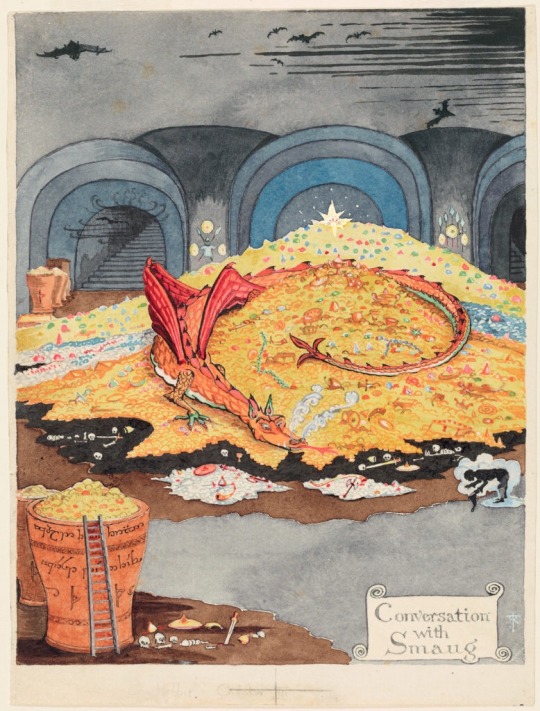
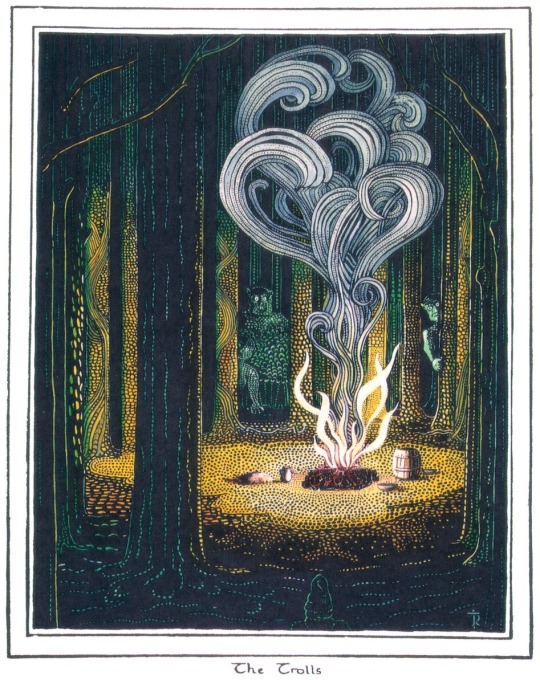
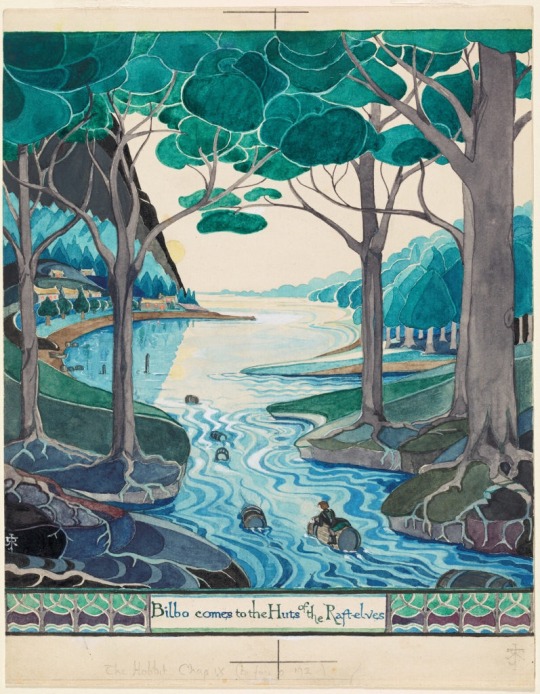
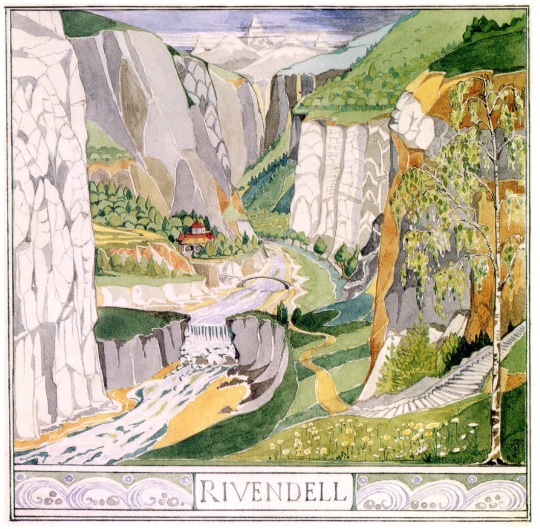
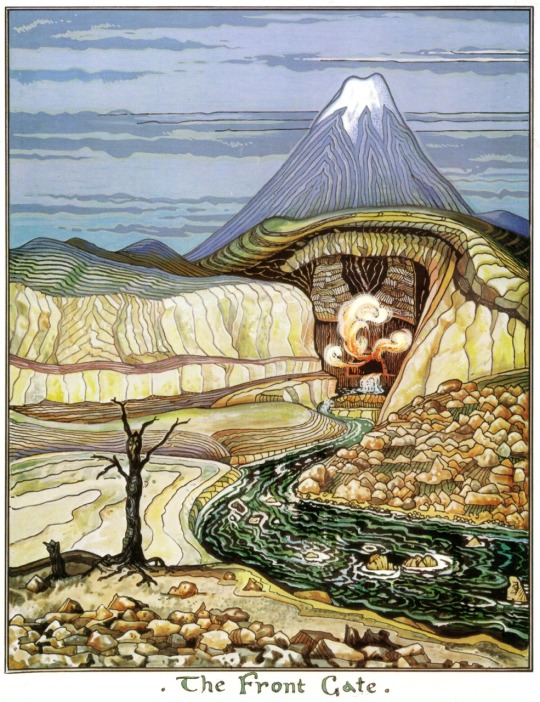
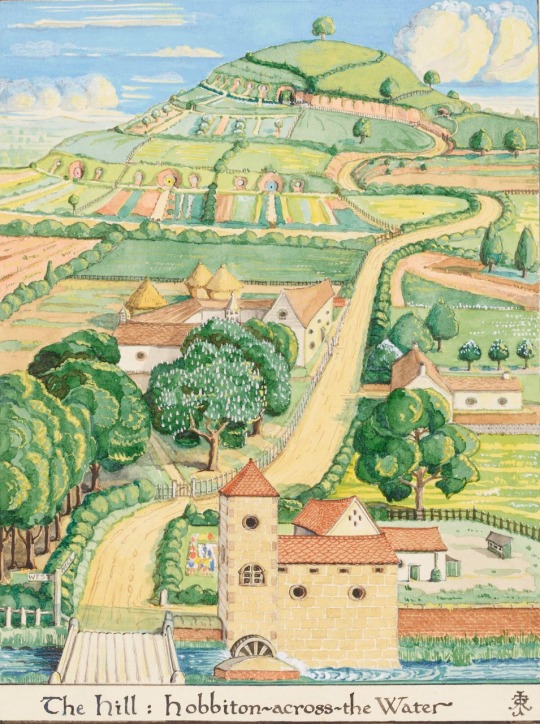
THE HOBBIT/LORD OF THE RINGS illustrations by J.R.R. Tolkien himself.
14K notes
·
View notes
Text
The Writing Mind: The Three Tools of the Writer
Once I had drafted my first novel (which is currently in the revision stage), I felt rather proud of myself. I had set my mind to a project and actually followed through with it. Though I still never spoke about the accomplishment to anyone other than my friends or by a singular “I did it!” tweet on Twitter, the experience brought an unlikely revelation my way. That is, I realized just how many people shared my goal and just how many people had story ideas exactly like I did. Mankind is a creature intrinsically drawn to stories; stories exist in our everyday lives, our every moment. Actually, take this time to imagine a world without them. Yeah, sure, no one could write a book, but also, you could never talk about your day, either. You could never tell someone about a time when you were younger, or about a great grandfather that they will never meet. And, of course, you could never hear Karen complain about how she had to speak to the manager at McDonald’s. We as humans have the art of telling a tale bred into our souls, and life without them would be quite difficult (and perhaps unfathomable).

A friend asked me something the other day that I feel captures my ideology on this subject. He simply asked me “How do you write?” Though he himself is an aspiring songwriter and was mainly referring to poetry, the purpose of my message still stands. The thing is that, if you want to write——if you want to focus on telling stories or writing poetry——you must change your psychology. When I started writing, I thought a certain way, but now I don't think that way anymore. The very way that my brain functions isn’t the same as it was when I began writing. As I said before, man is innately predisposed to storytelling; however, I do not believe that man is aware that he is such. It doesn't come immediately. Thankfully, you just have to work at it——and, I believe, anyone can. Stories exist all around us; they are a constant in nature and a product of the very flow of time itself. As long as things are able to change, there will always be stories to depict those changes; as long as conflict exists, there will always be stories of how they were resolved (both ending well and ending tragically). But the eye of the writer must be able to detect these subliminal clues; it must be able to point out the hints and determine where the story lies within them. One of my favorite quotes, by William Faulkner, will do well here, I believe: “A writer needs three things, experience, observation, and imagination, any two of which, at times any one of which, can supply the lack of the others.” A writer indeed has those three tools: observation, experience, and imagination. You must train yourself to be observant to little things. The world around us is begging to be seen in a different way; it is begging to be found as it is, and not as it is merely seen. Likewise, I read books all the time where a writer explains something so small in such a brilliant way. That's the Writer's Observation at work. Experience is a bit more concrete. Experience is known, where observation is acquired. You can inherently write about what you know and have lived through, mainly because you are the only one who wields that perspective, and you are the only one who wields in that particular way. Imagination is the strange one, mainly because it's abstract. Imagination is a mixture of wit and creativity. It's the place where a writer becomes an artist and twists things to his liking. In the hands of imagination, the universe is but a tool of the mind; it is but the hammer that collides onto the red-hot metal as the writer forms it into something brand new——some foreign mutation of what it once was. None of these three are promised and sometimes they are merely given. All around us, there are things for us to say and things for us to hear. We must simply know when to speak and when to listen.
*Photo by my friend, Morgan White
*This is the full post, but you can read the original post at williamfburk.com
1 note
·
View note
Text
On Fantasy, the Escapist, and Plato’s Cave
As a writer, I found the foundation of my own style only recently. The fantasy genre is much more than merely stories about heroes, elves, and dwarves. As a genre, it includes a specific set of characteristics; as a form of literature, it represents a realization that wells deep from within the human condition. Fantasy——and fantasy, in particular——is the Escapist’s Genre.
The very rise of the fantasy genre sprouts from despair. For my example, consider Tolkien’s The Hobbit. Published in 1939, the classic tale of the adventure of Bilbo Baggins came onto shelves during the eve of what would quite considerably be the largest war known to humanity. More so, the story arrived merely two decades after what was, at the time, the greatest war the world had ever known. The world faced depression; the world stared into the mirror and perceived their own mortality.
And thus, people wished to find a way out——to another world, another time.

To write fantasy is to seemingly write a paradox through a jagged spyglass. The world of the story must be unreal in some way. In contrast, it is the story’s realistic nature that captivates a reader. While the readers read to escape their surroundings, the readers secretly read to find themselves within the tale. So, while it is true that one wishes to leave the real world behind, it is just as true that one wishes to find shards of the real world in the place that the tale takes them to.
Along this vein of thought, the fantasy genre is comparable to Plato’s Analogy of the Cave. Imagine a person whom, throughout the entirety of his life, faced the back wall of a cave. And, as Plato puts it, there is a light that shines into the cave from the mouth, illuminating the back wall. People walk by the cave on the outside, casting shadows upon the wall for our prisoner to see. And, he sees nothing but these shadows. Given the only experience and knowledge he has perceived throughout his life, he would believe that these shadows are the “real” world and would not know that they are, in fact, merely the shadows of something else.
In certain aspects, fantasy stories follow this idea.
The writer creates a world, yet he can only make sense of it with what he knows and what he can fathom. One cannot write about something they do not cognitively perceive; creativity is only useful when it surfaces, not when it is dormant. So, then, the writer of fantasy, though crafty, must in some way or another cast shadows upon the wall for their reader (the chained man) to believe. This form of writing is, at its root, a type of trickery. It is a ploy by the hands of the writer, the Puller of Strings, to fool the reader into believing in the shadows: To make them care about non-existent characters, in non-existent places, doing non-existent things. With the reader always carefully in mind, the writer must piece together a mosaic of life and imagination, a collision of the real and the unreal. And therefore, as writers, we must watch the wall of the cave from the mouth, carefully observing the shadows that the world creates——and we must mold them to our liking.
*This is the full post, but it originally came from my website: williamfburk.com
*Photo courtesy of my friend, Morgan White
#amwriting#fantasy#writing community#writing commentary#writing#the hobbit#history#blogging#amblogging
0 notes
Text
What, indeed? The horizon is continually before us, chasing away the darkness of yesterday. So move on! You're wiser today than you were before! You can totes do the thing!

#nintendo switch#game pics#inspiration#you can do it#picoftheday#photooftheday#photography#octopath spoilers
1 note
·
View note
Text
THOUGHTS FROM THE DUNKIN' DONUTS PARKING LOT: THE ALCHEMIST-WRITER AND THE LIBRARY OF THE HUMAN EXPERIENCE
Not to get on a serious note or anything, but I wrote this little blurb, and I figured that I wanted to share it. It is simply a small observation about writing theory that came to me in a conversation with a friend as we drove down the street to Dunkin' Donuts. Anyways...
As a writer, I spend most of my day in the worlds that inhabit my mind. I will not pretend that writing came easy to me, as it did not. I began writing as a hobby when I was sixteen. The way this occurred was a somewhat unorthodox and incremental process, and, though I started at sixteen, I was not comfortable with my writing until I was twenty-three. I did not know this when I began, but writing involves reading, careful study, observation, and perception of the World around us. Writing is art, but simultaneously a science. A writer is an alchemist of the abstract, who gazes beyond the external world and into the unseen themes——the mechanics of the machine we call the soul or the “True World.” Like the alchemist, they are (and must be!) acutely aware of the elements that compound and consist the recipe we call prose or poem. Before the writer lies this multitude of elements——a Library of Themes that he or she must consider. The books of this Library have almost all but been told by the storytellers of ages gone. In the words of the unnamed teacher of Ecclesiastes, there is “nothing new under the sun,” but has merely been told time and time again.
For this Library is but a collection of the Human Experience, a plethora of our ideas and identity from which one must concoct something grand. This Library——this mortar and pestle in which the Alchemist-Writer uses to crush the ingredients is but a picture of us. The writer does not play merely with voice, meter, rhyme, character, setting, or plot; the writer tampers at the most atomic level with the pieces of the Human Experience. When one writes a poem, they write a message to the Spirit of Man; when one tells a story, they simply draw for their readers a mirror in which to gaze into. Ultimately, that is what the reader of the story yearns for (whether known to them or not). We not only want to read a wonderful tale, but we also want to see ourselves within it. And so the writer, then, has a crucial job: To remind us of who we are, and to tell us who we can become. This is the job of the Alchemist-Writer; this is the job of the one who peruses the Library of Human Experience. So, with that, next time you sit down to type a page, ask yourself: “What do I see in this mirror? And who is gazing back at me?”
It just happened like one of those 2 a.m. conversations, me and him just sitting in the Dunkin' parking lot before he had to clock in. I mean, the conversation didn't go exactly like the above, but I found myself wanting to spell out this idea in my mind. It was pretty much a realization to me. I felt one of those "that makes sense" feelings about it. Anyway, I thought it would be a great way to kick off the revival of my blog (from the grave). I hope you enjoyed! :)
3 notes
·
View notes






